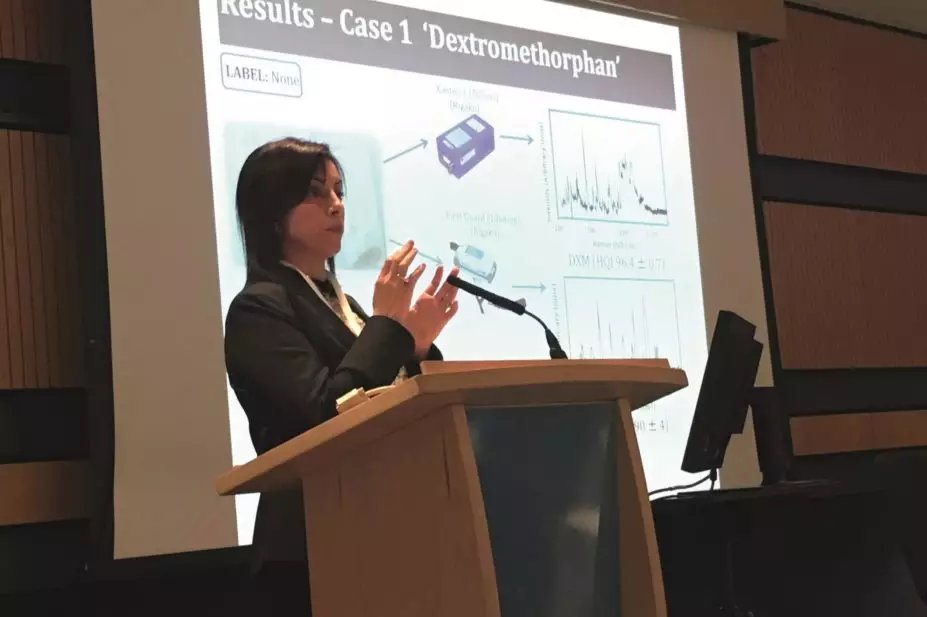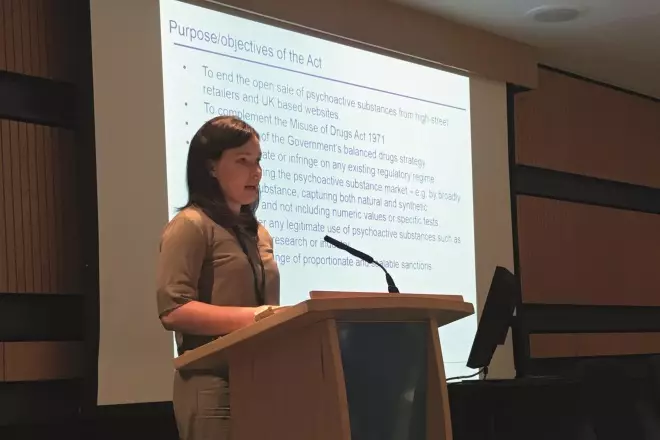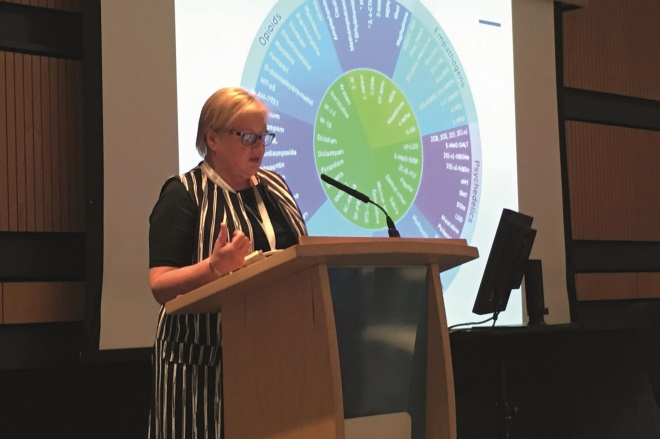
Julia Robinson
Nine years ago the term ‘novel psychoactive substance’ (NPS) was relatively unknown, but in 2008–2009 the drug market saw an influx of new, unrecognisable psychoactive substances. Since then, there has been a continuing demand for these drugs, also known as “legal highs”, with supplies readily available from clubs, headshops and the internet.
Users of NPS are reporting symptoms such as extreme toxic reactions, heart irregularities, mental health problems and damage to internal organs[1]
and there were 114 deaths from legal highs in 2015[2]
. However, current services in the NHS are unable to address the issue of NPS properly owing to a lack of knowledge about emerging NPS and the need for better links between non-specialist services and drug services and pathways for recovery and support.
What are novel psychoactive substances?
NPS are defined as psychoactive substances that legally mimic the effects of traditional drugs of abuse, such as heroin or cannabinoids, but are not internationally controlled. But how are they different from pharmaceuticals, what are the laws controlling them and what do pharmacists need to know?
These questions formed the basis to one of the sessions at the Royal Pharmaceutical Society annual conference, held at the International Convention Centre (ICC) in Birmingham on 4–5 September 2016, around the wider topic of ‘Innovation: new medicines, better medicines, better use of medicines’.
Amira Guirguis, a pharmacist and doctoral researcher from the University of Hertfordshire, started the session by explaining that the key difference between NPS and pharmaceuticals is that they “can be delivered by post, made yesterday in a kitchen or lab and are tested on humans today”.
“The only information is through peer-reported experiences,” she said. “They are intentionally mislabelled to circumvent the law (for example, as research chemicals or even bath salts and even potpourri) and are associated with unknown adverse effects,” she said.
It seems the primary issue with NPS for healthcare professionals, and law enforcement, is that often they have no idea what is in a NPS, and consequently how to treat each case they see.
The spread of these drugs is facilitated by online drug cultures with no need for face-to-face buyer-dealer interactions. The range of users of NPS is wide – from students and clubbers to the homeless and prisoners. The drugs themselves are also becoming increasingly complex making the chemical compositions more difficult to recognise and to detect by law enforcement. “By the end of 2015 there were at least two new drugs to the market every week,” Guirguis pointed out. “If you are a drug offender and want to use drugs during your probation period, you would use NPS because they are undetectable using the kind of techniques that are used [by law enforcement].”
New legislation
The Psychoactive Substances Act came into force on 26 May 2016, one year after it was proposed. Karen Lancaster, head of drugs legislation at the Home Office, explained that the purpose of the act was to end the open sale of psychoactive substances from high street retailers and UK-based websites. It also would complement but not replace the Misuse of Drugs Act 1971 and reduce demand and restriction supply; but not infringe on other laws or hinder any legitimate use or research.

Source: Julia Robinson / The Pharmaceutical Journal
Supply of NPS must be intentional in order for it to be a criminal offence said Karen Lancaster, head of drugs legislation at the Home Office
Criminal offences in regards to the act are focussed on supply and production, rather than possession (unless the person in question is in a custodial institution) and the penalties are in line with those associated with class B and C drugs such as cannabis (class B) and ketamine (class C), from seize and disposal to civil sanctions. When someone is suspected of NPS supply, Lancaster said that the nature of the offence must be considered. “Supply must be intentional – they have to have known or suspected that the drug is psychoactive,” she said.
The outcome of the act has been significant. According to Lancaster, there have been widespread headshop closures with UK-based websites starting to comply and over 200 arrests. To keep up with the market, the act also automatically includes all new drugs that produce a psychoactive effect. A 30-month review which will look at enforcement of the Act in order to assess the overall impact of it after that time.
It is as important to know about your patients illicit drug use as it is to know about their licit drug use
Guidance for pharmacists
In her talk, Guirguis explained the results of a survey[3]
she had conducted in order to determine the NPS knowledge of community pharmacists in North West London. The results of the survey revealed that most pharmacists had a very limited knowledge and many considered that NPS were not important to their work. However, it was also found those individuals were open to learning more about them.
Currently the Novel Psychoactive Treatment: UK Network (more commonly known as NEPTUNE) hosted by Central and North West London NHS Foundation Trust and funded by the Health Foundation, is the only guidance available to improve clinical practice in the management of harms resulting from the use of club drugs (psychoactive drugs that tend to be used by young adults at bars, nightclubs and concerts) and NPS. The guidance is aimed at clinicians working across healthcare areas including emergency departments, sexual health services and primary care.
“Pharmacists work in all of those settings giving advice, [aiding] medicines reconciliation, and prescribing and discharge planning,” said Carole Hunter, a lead pharmacist in addiction services at NHS Greater Glasgow and Clyde. “It is as important to know about your patients illicit drug use as it is to know about their licit drug use,” she adds.

Source: Julia Robinson / The Pharmaceutical Journal
“You may not know exactly what a substance is but if you know why a person took it, what kind of effect they were looking for – it gives you an indication of some of the likely affects and how it should be managed,” said Carole Hunter, a lead pharmacist in addiction services in Glasgow
NEPTUNE introduced three concepts in dealing with NPS – technical, clinical and cultural. While the technical and clinical concepts are bread and butter to most healthcare professionals, it is the cultural aspects of NPS that can provide the most useful information.
Who’s using NPS, how and where is use most prevalent? “NPS use is a global problem – particularly in north America and Europe,” says Hunter. “The UK represents 23% of the European total of NPS [use].”
A lot of this owes itself to what Hunter describes as a “night-time economy”, where night clubs, pubs and bars are all hot spots for NPS use. Even the genre of music played at a venue can impact on the pattern of drug use, for example, dance venues will see different drug users to a venue playing heavy metal. “These are all differences that pharmacists should be aware of,” stressed Hunter. There are also increasing concerns over ‘chemsex’, a term used to describe men who have sex with men under the influence of these drugs, described by Hunter as a “perfect storm for the transmission of HIV and hepatitis C”.
Hunter works in Glasgow where alcohol, heroin and benzodiazepines are the recreational substances of choice but she often sees these people use NPS to enhance the effects. Based on her experiences, she advises pharmacists to find out as much as they can from their patients in order to assess what kind of drug they have taken: “You may not know exactly what a substance is but if you know why a person took it, what kind of effect they were looking for – it gives you an indication of some of the likely affects and how it should be managed.”
“Pharmacists are the experts on drugs and the effect of drugs in the body. We need to be aware of special local issues and trends and also what the local treatment services are and how people can access them,” she adds.
With a more thorough knowledge of NPS and sharing of best practice between those who are experienced in the area of NPS, such as Hunter, and those who are naïve, pharmacists could be a useful source of information for NPS misusers and a valuable link in the chain of those working to manage NPS use in the UK.
References
[1] Royal College of Psychiatrists. One new drug a week: Why novel psychoactive substances and club drugs need a different response from UK treatment providers. Faculty report. Available at: http://www.rcpsych.ac.uk/pdf/FR%20AP%2002_Sept2014.pdf (accessed September 2016).
[2] Gulland A. Drug deaths hit record high in England and Wales, figures show. The BMJ 2016;354:i4921. doi: 10.1136/bmj.i4921
[3] Guirguis A, Corkery J, Stair J et al. Survey of knowledge of legal highs (novel psychoactive substances) amongst London pharmacists. Drugs and Alcohol Today 2015;15:93-99. doi: 10.1108/DAT-03-2015-0012
You may also be interested in
Long service of members

Membership fees 2022
